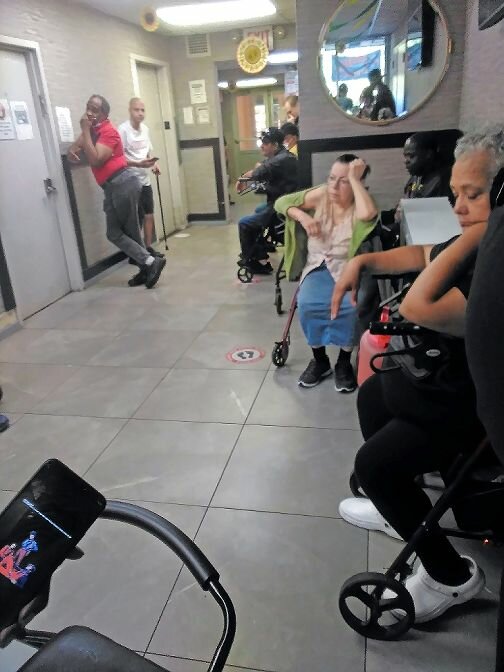The W residents blocked from ‘rights’ sessions
Complaint from two groups charge management not allowing vital meetings
The W Assisted Living at Riverdale Home for Adults is interfering with the rights of its roughly 250 residents to communicate confidentially with outside community groups that are trying to help them, according to a complaint filed with the New York State Department of Health.
For much of the past year, two not-for-profits — Mobilization for Justice, and the Coalition of the Institutionalized Aged and Disabled — have attempted to hold “know-your-rights” sessions at The W Assisted Living of Riverdale, said the complaint, dated June 6.
The Bronx adult home has meddled with the meetings, imposing conditions that have stopped the groups from holding the private sessions, according to Tanya Kessler, a senior staff attorney with Mobilization for Justice. That organization provides free legal assistance to low-income New Yorkers.
“We filed a complaint after we were unable to schedule residents rights training there without interference from [The W] staff,” Kessler told The Riverdale Press.
MFJ and CIAD typically hold the sessions at adult homes across New York City. The objective of the meetings is to educate residents about their rights and how to solve problems and complaints, she said. The sessions usually last an hour although MFJ and CIAD staff will stick around to answer questions, Kessler said. The meetings aren’t compulsory, and residents don’t have to attend, she said. The sessions, however, are confidential and just for the residents of adult homes, Kessler said.
The meetings often cover basic issues such as:
• The resident’s right to choice in treatment, including whether they can go to a doctor who isn’t part of The W (they can);
• Resident rights in an eviction process;
• How their personal allowance works; and
• How they can request a printout of rental payments to The W.
The W Assisted Living at Riverdale is an adult home located near 254th Street and Broadway. The facility caters to adult residents who can’t live by themselves due to “physical, mental, or other limitations” that can come from age or other factors, according to a definition on the New York State Department of Health website. Many residents of The W Assisted Living suffer from mental illness, and several have lived there for more than a decade. The W Assisted Living of Riverdale is licensed by New York State Department of Health.
Kessler has made many requests to hold the private sessions at The W Assisted Living at Riverdale, according to 15 emails and faxes viewed by The Press. The adult home has neither answered the organizations’ messages, tried to delay or interfered with the meetings themselves.
The opposition is coming from Vernal Brown, senior administrator of The W Assisted Living at Riverdale.
Brown has made several excuses as to why MFJ and CIAD could not hold their sessions at The W Assisted Living. At one point, he said he couldn’t schedule the meeting, because it would conflict with the Jewish holidays, according to a fax dated April 10. For another session, scheduled in May, Brown wouldn’t confirm a date, claiming that company leadership wasn’t around.
“Our senior management were away at ESAAL (Empire State Association of Assisted Living) annual conference. They just returned. We will forward a response shortly,” he said in a May 5 email.
But Brown’s main problem is his claim that the residents of The W Assisted Living, namely the home’s Resident Council, want staff present at the sessions. Brown is requiring that any “know-your-rights” meetings have employees of The W in attendance.
Kessler said that this condition would likely have a chilling effect on residents, intimidating them from speaking freely about any issues or problems they might have with the facility. This condition also violates New York State Department of Health state regulations. Operators of adult homes licensed by NYSDOH cannot restrict or prevent the access of community or service organizations, who are trying to educate or help resolve problems or complaints, according to regulations. Adult home operators also “shall not interfere with confidential visits with residents and persons assured access under this section,” according to the NYSDOH regulations.
“Training is a back-and-forth process,” Kessler said. “Bringing adult home staff into the training inhibits and intimidates residents from participating and openly asking questions about problems they’re having in the home. That is a right that is protected. The residents have a right to private communications with us under state regulations.”
The MFJ and CIAD have held “know-your-rights” sessions in adult homes for many years. For the W, they have offered to hold separate meetings for residents and employees but only after having a confidential session with the residents first, Kessler said. She has not received a response from Brown.
“Even if a facility is not retaliating, [residents] are much more comfortable asking questions and speaking up when the staff are not present,” Kessler said.
The W Group doesn’t represent everyone living in the adult home, Kessler said. MFJ and CIAD have spoken to residents who want the training to be confidential, without any employees present, she said.
“The W cannot deny residents the ability to communicate with groups privately because a few residents have said that’s not what they want,” Kessler said.
The W Assisted Living at Riverdale is owned by The W Management Group, which does business as The W Group. A financial investor, The W Group is one of the biggest operators of assisted living facilities in New York state. Their portfolio includes more than 20 assisted living homes, including three in the Bronx.
In June, The Press questioned the safety of residents at the adult home. Mice and roaches crawl everywhere at The W Assisted Living, while the bathrooms are rarely cleaned, The Press reported. The elevators are often broken, forcing many residents, some who use walkers, to sleep on the first floor. The food served to the home’s residents, who are mainly mentally ill, is boring and lacks nutrition, according to the story.
The W Group of Riverdale said that it places the needs of its residents first and it is they who will decide “who they wish to visit and under what condition,” according to a statement received on Sept. 29.
The W Group confirmed that it did receive a request in March to hold the training sessions, which was approved by the residents. However, the residents requested that the W Group staff would be in attendance, the statement said.
“The residents decision was communicated to the group wishing to speak to them but was rejected because they insisted that the staff not be present,” the statement said. The W Group said it is “agreeable to work out and accommodation and had in fact offered a date for this meeting.”
The W’s claim is not correct.
Kessler asked to hold training sessions at The W Assisted Living at Riverdale on May 16 or May 19, according to a March 29 letter to Brown. The senior administrator agreed to “accommodate” the meeting scheduled for May 26 but failed to inform the groups of his decision until the day before the session, according to a May 25 email. Brown also told Kessler that employees would attend the meeting, claiming that the residents “were insistent on staff representation,” the May 25 message said. Brown did not indicate if The W would allow any confidential resident-only sessions.
“We had to cancel the presentation because the conditions they imposed served to intimidate residents, and violated DOH’s regulations,” Kessler told The Press.
New York State DOH regulations require adult homes to help residents organize and maintain any councils or committees they may choose to form, according to a June 27 advisory from Kelly Ann Anderson, director of adult care facility and assisted living surveillance said.
Resident councils are typically made up of people who live at the facility and meet on a regular basis. A resident council is supposed to represent the interest of its members; their goal is to improve the quality of life for home residents. The adult care facilities must allow residents “to meet without staff present if they so desire,” the June 27 advisory said.
While adult homes must aid resident councils, there is no mandate that homes like The W Assisted Living hold “know-your-rights sessions.”
Curiously, the not-for-profits this year have held the educational sessions at other homes owned by The W Group, including Sanford Home in Flushing in Queens and Bronxwood Assisted Living in the Bronx in March.
“There was no problem with them insisting on staff being present for ‘know-your-rights’ training,” Kessler said.
The NYSDOH is investigating the complaint but it’s unclear if a surveyor has been assigned, Kessler said. “We file complaints on behalf of residents and when our right to access private communications are violated, it typically takes years to get a result. It’s a huge problem,” she said. “It’s very discouraging to residents when they don’t hear anything back for months and months and months.”
When asked about the complaint from the Mobilization for Justice and CIAD, Monica Pomeroy, a NYSDOH spokeswoman, said: “The department is reviewing the facility’s regulatory compliance and cannot comment on active or ongoing investigations.”









